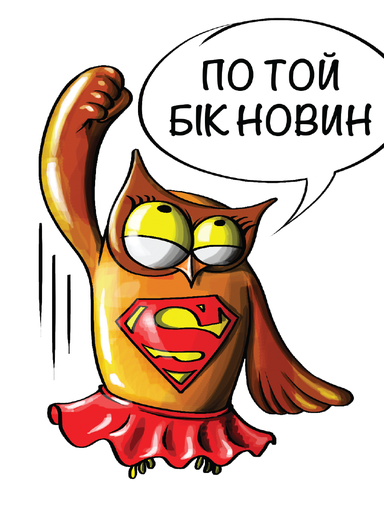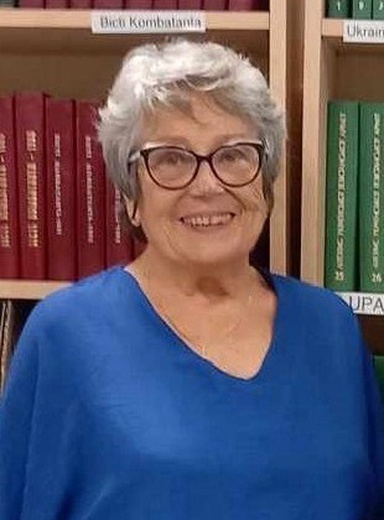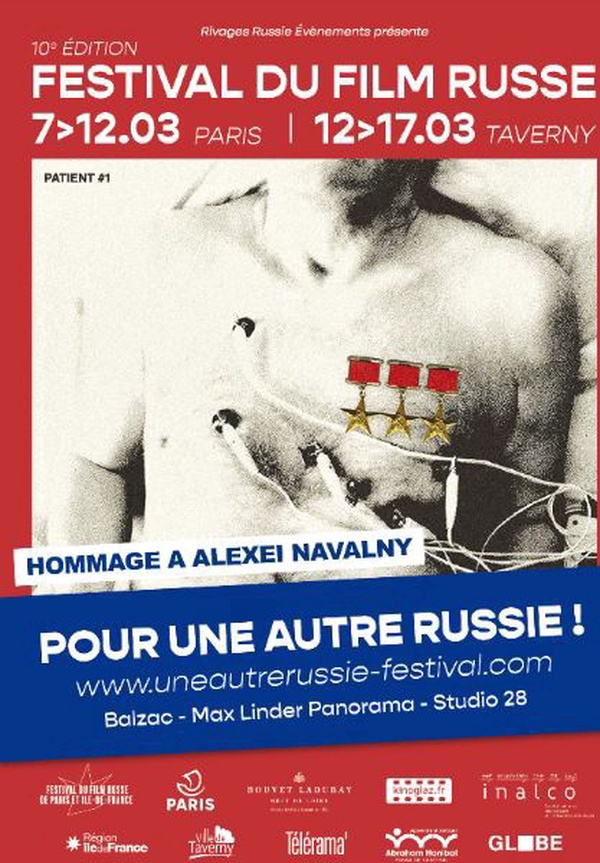The Great Ventriloquist: whose voice echoes through the Russian Classics?
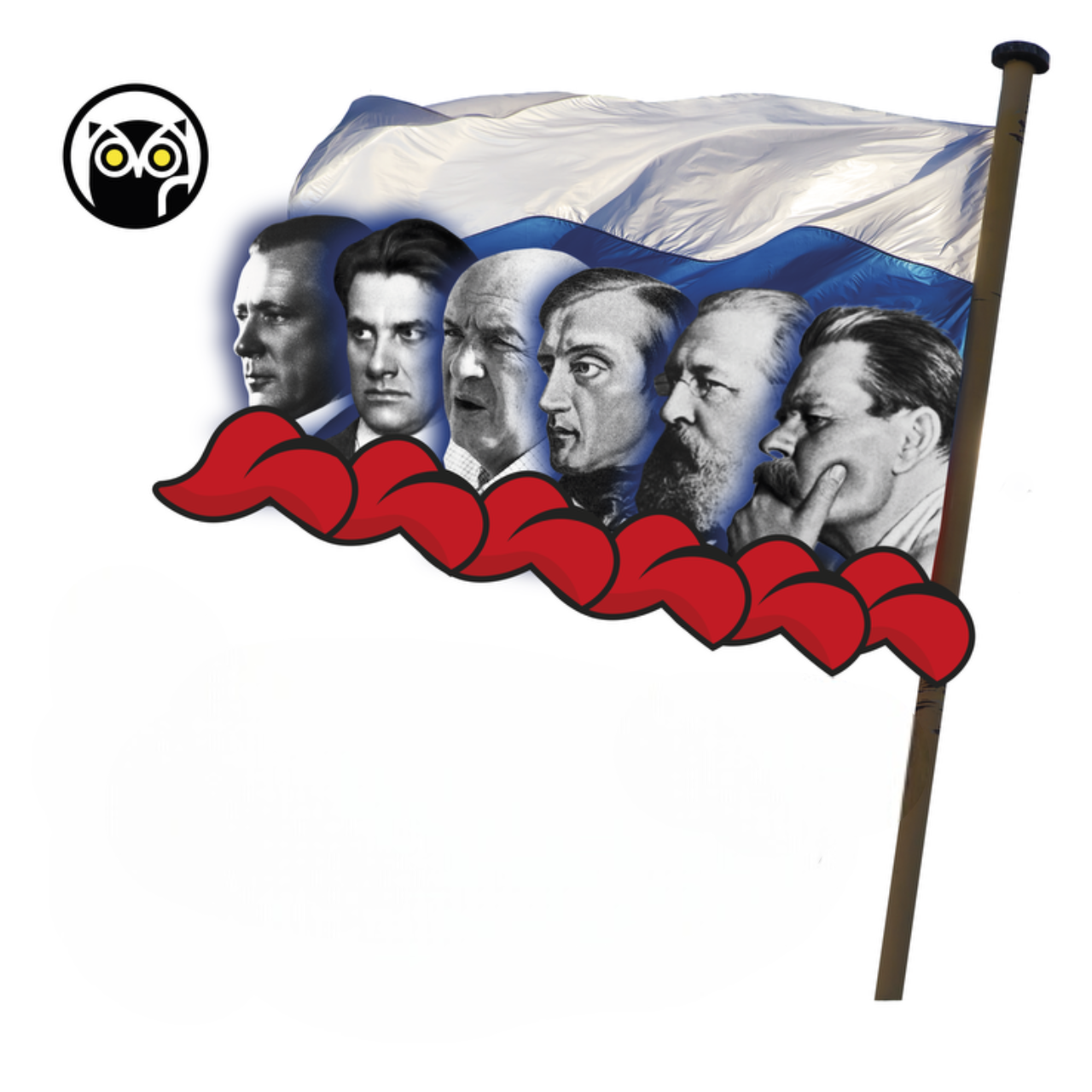
Author: Katia Potapenko co-authored by Olia Virsta
"When I want a real nightmare, I imagine Gogol penning in the ‘Malorussian’ (Malorussian or Little Russian = Ukrainian-ed] dialect volume after volume of ‘Dikanka’ and ‘Mirgorod’”
Vladimir Nabokov
In February 2023, Russian “historian” Boris Yakemenko, speaking on Solovyov.Live, called for prohibiting children — “refugees from Ukraine” but actually forcibly relocated to Russia — from speaking their native language:
“This contagion can easily spread from one head to another. We need to break up these groups and prevent them from organizing. In any Russian school where there are migrants in the classroom, the native language in which they try to communicate should be banned. Communication within any Russian state institutions for migrant children should be mandatory in Russian. If they don’t know it, they must learn it.”
Such a statement might not seem so alarming if we didn’t witness the practical manifestations of this ideology beyond Russian borders. In occupied Ukrainian cities like Kreminna. Russians first systematically dismantle road signs, destroy Ukrainian literature, printed materials, and media. The occupation authorities disseminate information only in Russian, enforcing its use in every aspect of life, from advertising to classroom lessons. Taras Kremin, the Ukrainian Commissioner for the Protection of the State Language, identifies six signs of linguicide (linguistic oppression) in the temporarily occupied territories.
The Solovyov.Live propagandist Yakemenko’s vocal stance on youth issues is not surprising, given that his brother Vasyl led the “Idushchiye Vmeste” [Going Together-ed] youth movement and served as its chief instigator, speechwriter, and ideologue. Established in 2000, the movement’s actions included burning the American flag during a rally near the US Embassy.
But Boris Yakemenko doesn’t stop at advocating for the mandatory use of the Russian language:
“Any attempts to speak in the classroom, in the corridor, in the cafeteria with your compatriot in your own language should be considered a violation of the existing order with all the ensuing consequences. From these conversations in one’s own language, young people aren’t very far from forming a national group, and then a small national gang, which quickly begins to establish its own order. Therefore, the dictates of the Russian order, Russian ideology, and the defense of one’s own territory on one’s own territory should be the most important tools for influencing these people.”
Let’s dissect this quote because, like all Russian propaganda, it contains several narratives.
- any language that isn’t Russian (referring to the language spoken by migrants, as per the Russian propagandist; read between the lines — Ukrainian) is viewed as a contagion capable of spreading rapidly.
- if you don’t know Russian, you must learn it (here, of course, they proclaim its “superiority” and “advantages”).
- the mere presence of the Ukrainian language threatens the dictates of Russian ideology (and this scares them a lot), so any manifestation of Ukrainian must be harshly suppressed.
But where do these sentiments originate?
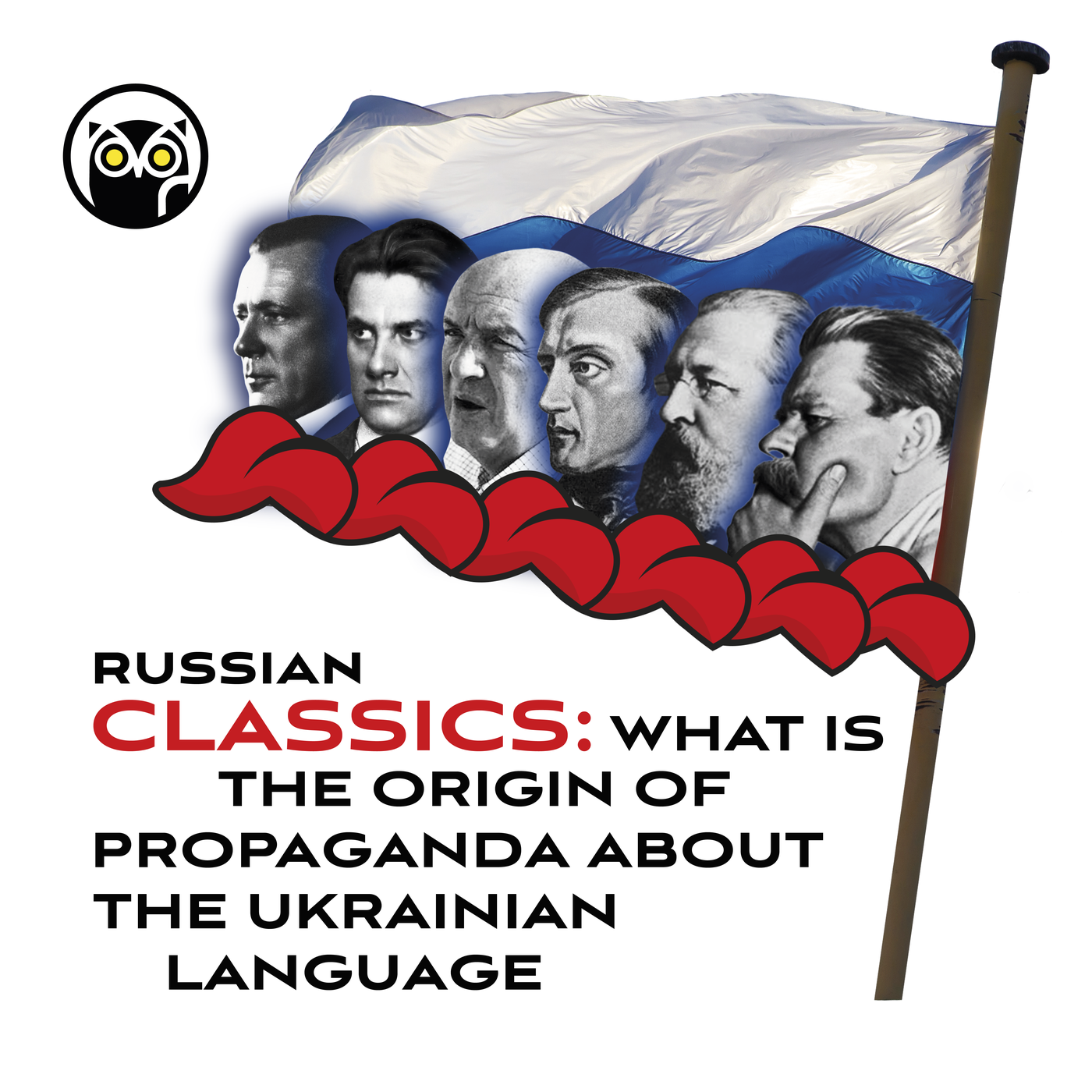
"Lingo", "dialect", "up-country", "a language that doesn’t exist". These are the narratives embedded within the classics of Russian literature, spanning fiction, literary criticism, and personal correspondence. Russian writers often deliberately distort Ukrainian words, portraying them as “implausible, artificial, fictional” compared to their Russian counterparts. Even the renowned Vladimir Solovyov, often regarded as the “propagandist of all propagandists,” attempted to illustrate how differently Ukrainians pronounce the letter “ф” (f), only to falter into grunts and grimaces.
In Mikhail Bulgakov’s novel, "The White Guard", protagonist Alexei Turbin frequently demonstrates a dismissive stance toward the Ukrainian language. This attitude often intertwines with prevalent stereotypes, such as accusations of “treason” and Great Russian chauvinism.
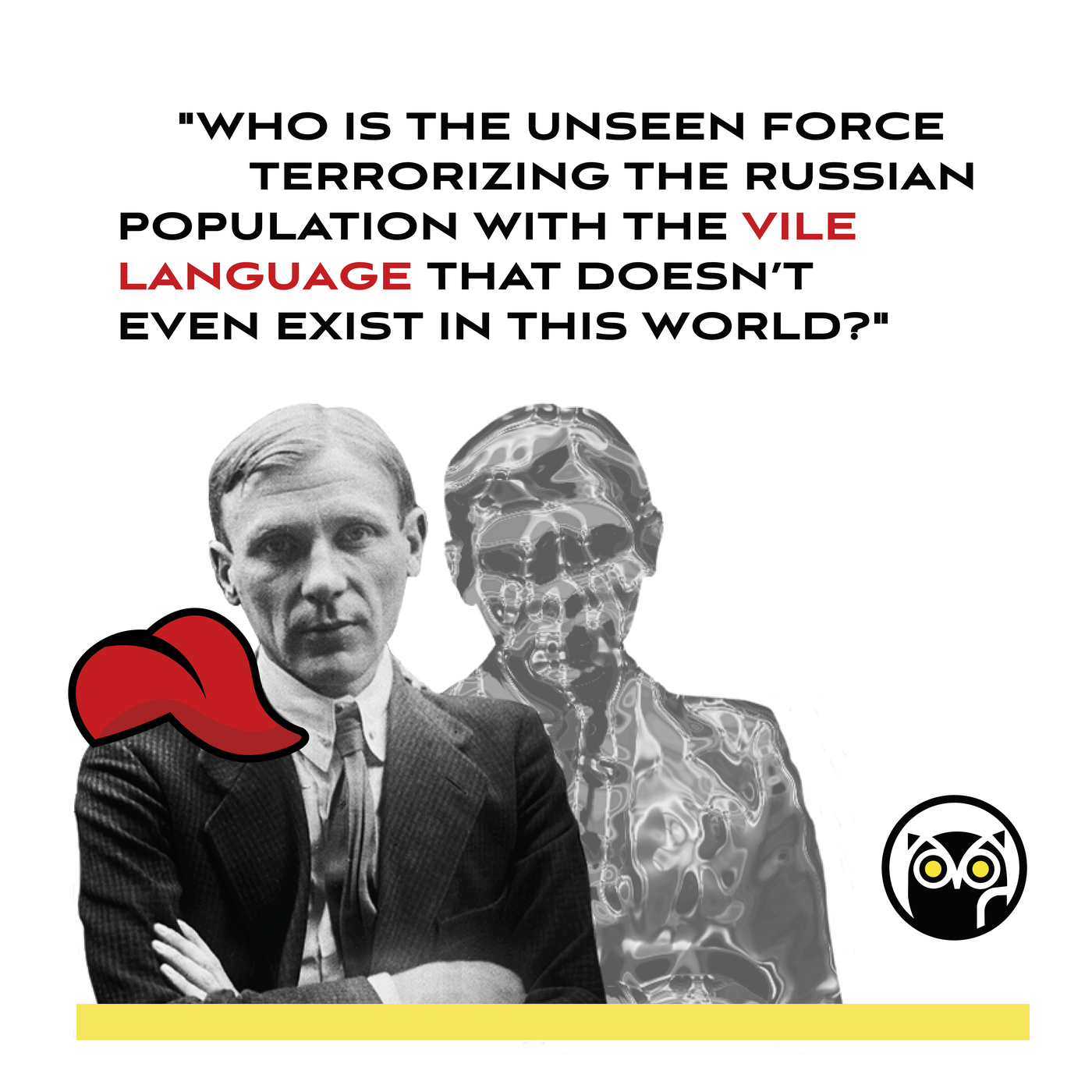
“I have respect for all languages and lingos, but nevertheless the signs in Kiev must be rewritten. You can’t really knock out the letter “я” (ya) in the word “homeopaticheskaya” and think that this will transform a pharmacy from a Russian one into a Ukrainian one. Finally, we need to agree on the name of the place where citizens can get a haircut and a shave: “голярня”, “перукарня”, “цирульня” [all three Ukrainian words can be translated as “hairdresser’s/barber shop”-ed], or simply just “парикмахерская” [“hairdresser’s shop” in Russian-ed]. It seems to me that out of the four words — “молошна”, “молочна”, “молочарня” and “молошная” [all four Ukrainian words can be translated as “dairy shop”-ed], the fifth word — “молочная” [“dairy shop” in Russian-ed] would be the most appropriate.”
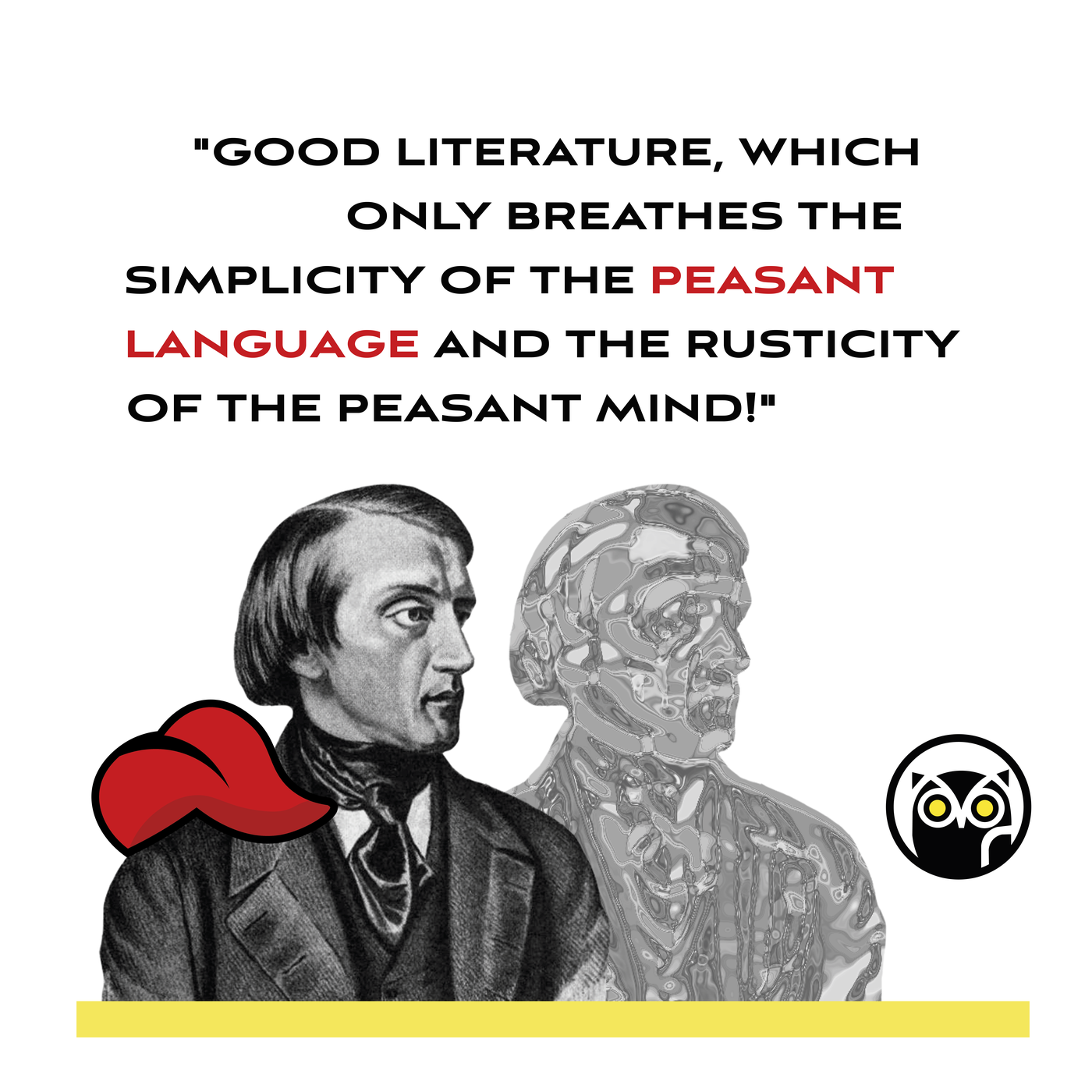
The Russian literary critic Vissarion Belinsky, renowned for his admiration of the loyalist Alexander Pushkin, rejected the autonomy of the Ukrainian language. He advocated for writing in the “widely understood language” [i.e., Russian-ed] and openly called Ukrainian writers names, nurturing a particular animosity toward the freedom-loving Taras Shevchenko. In a letter to Pavlo Annenkov (1847), he wrote:
“Common sense should see Shevchenko as a donkey, a patsy, and a fool.”
In 1841, in a review in the Lastivka almanac, which was ideologically driven by Yevhen Hrebinka, Vissarion Belinsky underscored his disdain for publishing works that he deemed comprehensible only to peasants. He went so far as to consider it “harmful” to create literature in the “regional lingo”:
“Good literature, which only breathes the simplicity of the peasant language and the rusticity of the peasant mind!”
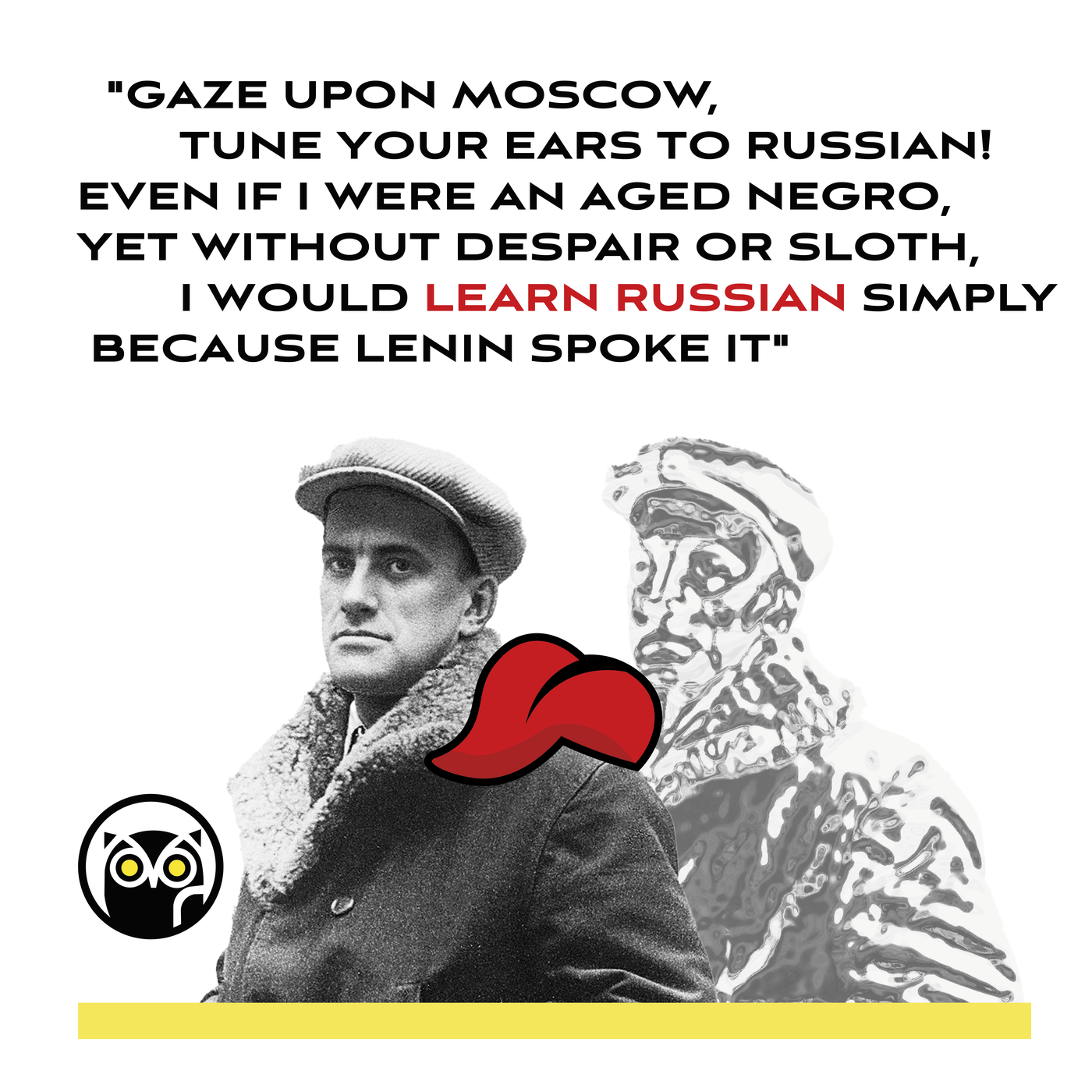
The assertion — “If they don’t know Russian, they must learn it,” from Boris Yakemenko — echoes a sentiment found in a poem by the Soviet poet Vladimir Mayakovsky, whose perspectives on Ukraine ranged from one extreme to another. In his poem “To Our Youth,” Mayakovsky resorts to traditionally derogatory terms like “khokhol” and “negro,” while ridiculing the language, all under the guise of Great Russian chauvinism.
“One day, after I’d dumped my stuff at the hotel,
I forgot its location.
I asked a khokhol for the address in Russian,
The khokhol replied: I can’t hear you...
But there’s no room for anger,
Don’t tarnish the good souls!
Young comrades, gaze upon Moscow,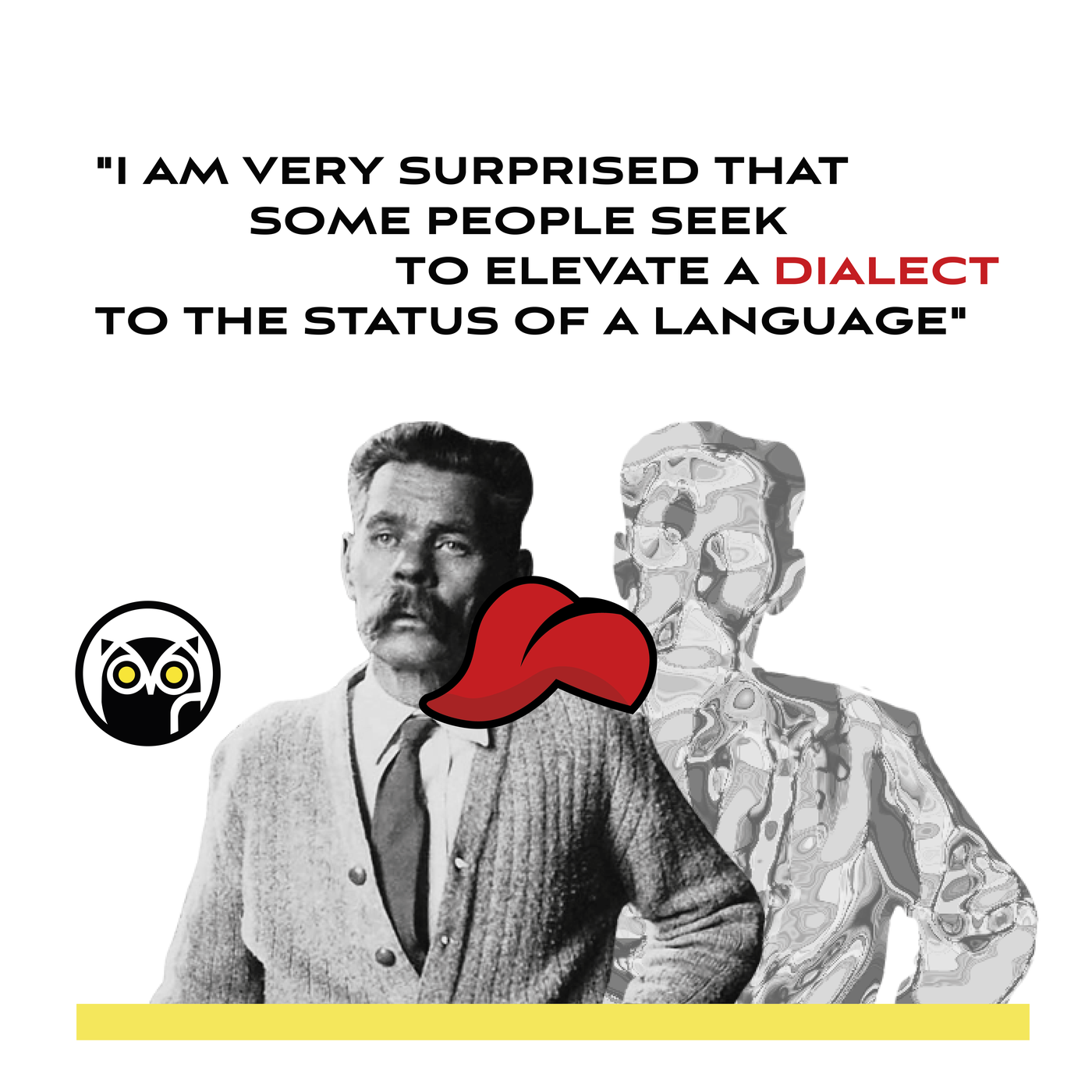
Tune your ears to Russian!
Even if I were an aged negro,
Yet without despair or sloth,
I would learn Russian simply because
Lenin spoke it.”
“Dear Alexei Andreevich! I am firmly against the abridgement of the novel ‘Mother.’ In addition, it seems unnecessary to translate this story into the Ukrainian lingo. I am very surprised that some people, with the same aim in mind, not only emphasize the differences between lingos but also seek to elevate a lingo to the status of a ‘language,’ thereby suppressing those Great Russians who find themselves in the minority within this lingo.”
Interestingly, this letter was published in the VAPLITE magazine, and later, Maxim Gorky “repented” and the novel was translated.
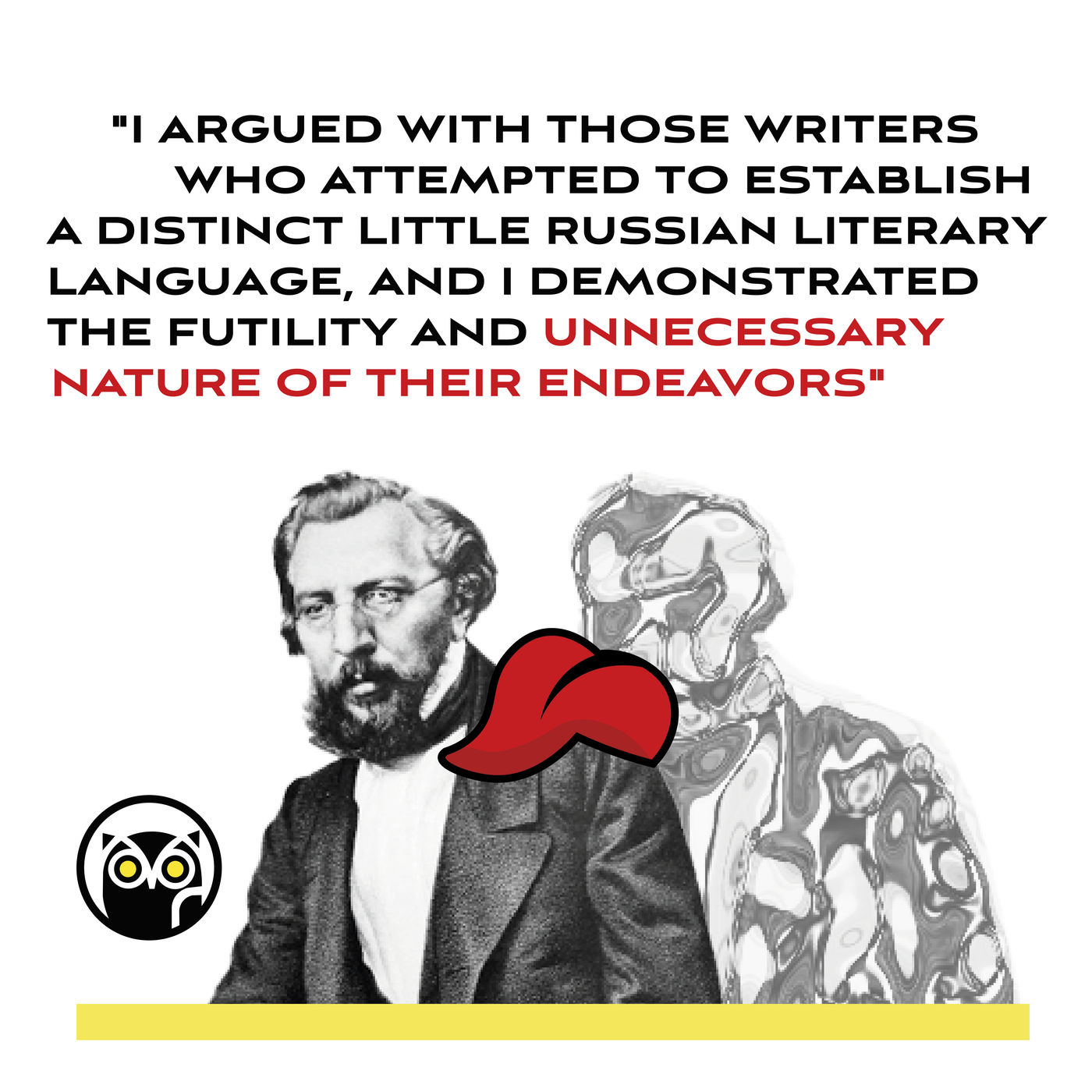
The Russian publicist Ivan Aksakov, renowned for his Slavophile beliefs and Russian chauvinism, dedicated a significant portion of his writings to advocating for the Russification of Ukraine.
“…I argued with those writers who attempted to establish a distinct Little Russian literary language, and I demonstrated the futility and unnecessary nature of their endeavors. I engaged in lively debates with Mr. Kulish, Mr. Kostomarov, and ‘Osnova’."
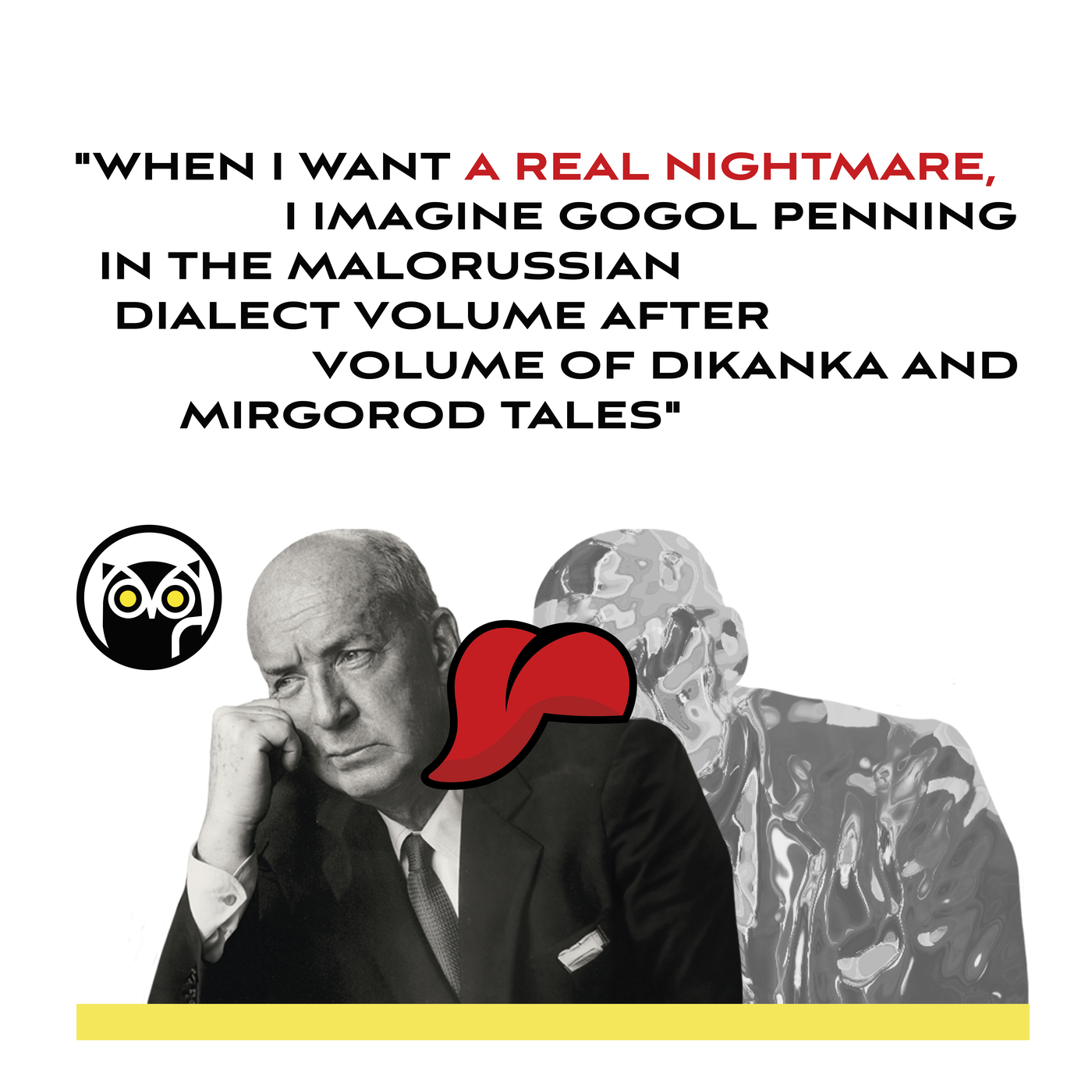
In 1944, the Russian émigré writer Vladimir Nabokov published a book in English about Mykola Gogol, suggesting that Gogol had saved himself from becoming a Ukrainian writer:
“During the time of ‘Dikanka’ and ‘Taras Bulba’, Gogol teetered on the brink of a dangerous abyss (and wisely chose to abandon these youthful, artificial creations in his later years). He nearly embraced the role of author of Ukrainian folklore and vivid romantic tales. We should be grateful to fate (and Gogol’s desire for global recognition) that he refrained from adopting Ukrainian dialectal words for his expression, as he would have been lost otherwise. When I want a real nightmare, I imagine Gogol penning in the Malorussian dialect volume after volume of Dikanka and Mirgorod tales of wandering ghosts along the Dnipro, comical Jewish characters, and dashing Cossacks.”
If you can’t destroy someone, humiliate them — this appears to be the guiding principle the Russian Empire adopted for centuries. If Russians find the Ukrainian language alone so intolerable, what does that say about their acceptance of Ukraine as a sovereign state?
Russian literature, serving as a cornerstone in shaping Russian identity, has long advocated the notion of unity — being “one and indivisible”. Russia envisions itself as an empire “from the Nile to the Neva, from the Ganges to the Danube,” as painted by its writers, irrespective of the official government or state structure ![]()
Read more on the imperial aspirations depicted in classical literature in the upcoming article.

